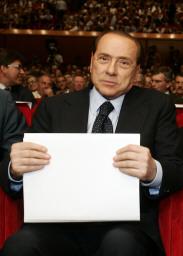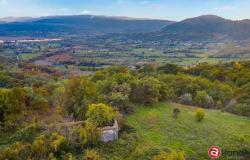Opposition parties were fuming on Wednesday after the Senate gave the definitive go-ahead to a controversial immunity bill that will freeze a number of trials involving Premier Silvio Berlusconi.
The so-called Alfano Law - after Justice Minister Angelino Alfano - gives immunity to Italy's top four institutional figures (the president, the premier and the two parliamentary speakers) while in office.
The law was rushed through parliament in just 25 days, despite opposition from critics who claimed it was tailor-made to help Berlusconi wriggle free from his ongoing trials.
''Dialogue with a government that wants to create a sovereign without limits is extremely difficult,'' said opposition Democratic Party Senate whip Anna Finocchiaro, commenting on the law.
''In a climate like this it's very hard to find a common thread of reason''.
The leader of opposition party Italy of Values, Antonio Di Pietro, meanwhile said he would ''immediately'' begin collecting the 500,000 signatures needed for a public referendum to repeal the law.
But Alfano and other government ministers defended the measure, saying it brings Italy in line with other European countries.
They also hit out at Nicola Mancino, deputy president of the Supreme Council of Magistrates (CSM), who said Wednesday that the bill should have been accompanied by a revision to the Italian constitution, which states that everyone is equal before the law.
The government says that since the measure suspends, rather than cancels, trials, it remains in line with the constitutional principle.
The law is thought to have been worded in a way that will not cause problems for the Constitutional Court, which threw out an earlier incarnation of the law in January 2004.
During that ruling, the court nevertheless ruled that there was ''an appreciable interest'' in safeguarding the ''calm performance'' of figures holding the top state roles if essential conditions could be met.
''As far as I'm concerned the measure is now state law,'' said Alfano, responding to Mancino's concerns. ''We are already concentrating on other matters''.
Under the new law, two ongoing cases against Berlusconi will be frozen.
In one trial, the prime minister is accused of paying British corporate lawyer David Mills a $600,000 bribe to hush up incriminating evidence in earlier trials.
In a second, Berlusconi and 11 other defendants stand accused of fraud over film rights relating to Berlusconi's private TV network company Mediaset.
A probe based on tapped phone calls between Berlusconi and the head of the RAI state TV network, Agostino Sacca', in which the premier is accused of trying to corrupt a senator to bring down the last government, will also be shelved.
The premier and all other defendants deny wrongdoing.










